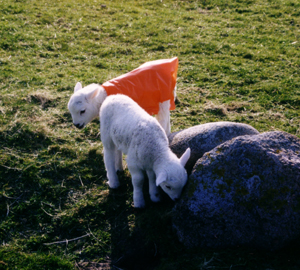“The Lamb” & “The Tyger,” by William Blake
Both of these poems appear in Songs of Innocence and Experience. “The Lamb” also appears in the earlier-published Songs of Innocence. For some background information on Blake, see the following entries in the Johns Hopkins Guide to Literary Theory & Criticism (which is a useful resource for just about any literary topic, and may only be available on Loyola’s campus): “Blake, William,” and “British Theory and Criticism: 3. Romantic Period and Early Nineteenth Century.”
For both of these poems, see also the notes for 11 Sept. 2007, which contain links to several images of each poem.
The Lamb
Little Lamb who made thee
Dost thou know who made thee
Gave thee life & bid thee feed.
By the stream & o’er the mead;
Gave thee clothing of delight,
Softest clothing wooly bright;
Gave thee such a tender voice,
Making all the vales rejoice:
Little Lamb who made thee
Dost thou know who made theeLittle Lamb I’ll tell thee,
Little Lamb I’ll tell thee:
He is called by thy name,
For he calls himself a Lamb:
He is meek & he is mild,
He became a little child:
I a child & thou a lamb,
We are called by his name.
Little Lamb God bless thee.
Little Lamb God bless thee.
Note the repetition and the (obvious!) connection to the Lamb in Pearl. But contrast the lilting sweetness of this poem to the following aggressive language in “The Tyger”:
The Tyger
Tyger Tyger. burning bright,
In the forests of the night;
What immortal hand or eye,
Could frame thy fearful symmetry?In what distant deeps or skies.
Burnt the fire of thine eyes?
On what wings dare he aspire?
What the hand, dare sieze the fire?And what shoulder, & what art,
Could twist the sinews of thy heart?
And when thy heart began to beat.
What dread hand? & what dread feet?
What the hammer? what the chain,
In what furnace was thy brain?
What the anvil? what dread grasp,
Dare its deadly terrors clasp?When the stars threw down their spears
And water’d heaven with their tears:
Did he smile his work to see?
Did he who made the Lamb make thee?Tyger Tyger burning bright,
In the forests of the night:
What immortal hand or eye,
Dare frame thy fearful symmetry?
In Blake’s poem, the tiger functions as something monstrous, something awful (in every sense of the word). It is worth noting that Blake was influential in scholarship on John Milton’s Paradise Lost, a poem “Of Man’s first disobedience” (I.1), especially in advancing the idea that Satan is the poem’s “hero.”
But I should end on a happier note, so enjoy this picture:
